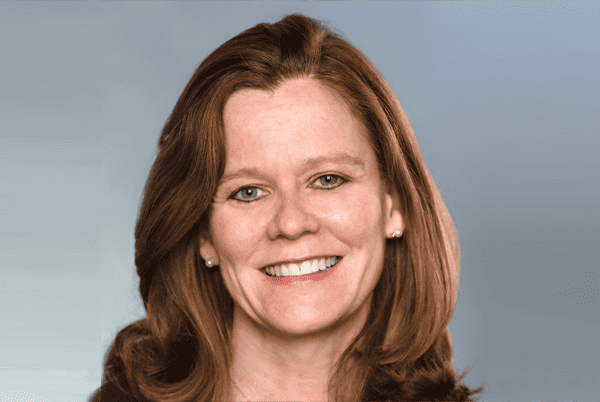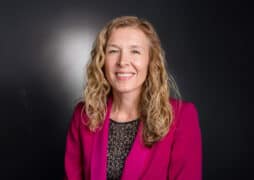
Ann H. Partridge, M.D., MPH, and Jennifer Pietenpol, Ph.D., are making history at Susan G. Komen. For the first time, two women are serving simultaneously as the Chief Scientific Advisors, guiding Komen’s research strategy, investments and programs. In their respective roles, Dr. Partridge and Dr. Pietenpol are identifying the greatest opportunities to accelerate advances in breast cancer research and address the health inequities that prevent all people from receiving access to timely, high-quality breast cancer care.
Dr. Partridge was appointed in December 2022 to be Komen’s newest Chief Scientific Advisor, replacing outgoing Chief Scientific Advisor George Sledge, M.D.
“The more effective we are with treating, preventing and screening for breast cancer, the greater the chance that disparities may grow if we cannot get these therapies to every patient who needs them.”
Dr. Ann Partridge
“One of Komen’s greatest strengths is the ability to reach potentially every person and their loved ones across the United States to help improve and provide access to equitable care and optimal outcomes,” Dr. Partridge said. “Komen is in a rarefied place of being able to change the face of breast cancer over the next five to 10 years – by reaching more patients, supporting more research, advocating for better policy to improve breast cancer care and outcomes, and supporting people to get access to optimal care.”
As a practicing medical oncologist and clinical researcher, Dr. Partridge has dedicated her career to improving the care and outcomes of cancer patients, especially young women. Based at Dana-Farber Cancer Institute, Dr. Partridge serves as the Eric P. Winer, M.D., Chair in Breast Cancer Research, Vice Chair of Medical Oncology, Director of the Adult Survivorship Program and Director of the Program for Young Women with Breast Cancer.
For Dr. Partridge, the most inspiring aspect of her job is seeing her patients thrive in survivorship, especially her young patients who go on to live full lives and have children. She is the lead U.S. investigator on a global study called the POSITIVE trial, which found that young women can take a two-year break from endocrine therapy to pursue pregnancy without the short-term risk of recurrence.
“These women don’t want to put their lives on hold,” Dr. Partridge said. “I think the results of our research looking at fertility and the safety of pregnancy after breast cancer, particularly for women with hormone receptor-positive breast cancer, will provide so much encouragement and inspiration for our young survivors, who often are so downtrodden by both the diagnosis and the aggressive treatments that they often need.”
Improving Outcomes for Breast Cancer Patients
Dr. Pietenpol has been Komen’s Chief Scientific Advisor since 2017. As an Ingram Professor of Cancer Research and the Chief Scientific and Strategy Officer at Vanderbilt University Medical Center, she has devoted her research career to improving outcomes for breast cancer patients.
Most recently, Dr. Pietenpol has focused her research on identifying molecular subtypes of triple negative breast cancer. The results from her laboratory-based work are being translated into clinical trials investigating targeted therapies for patients with triple negative breast cancer to help oncologists determine the most appropriate and precise treatment.
“The insights we gained from that research enabled us to design clinical trials to bring drug combinations and biologics together to personalize the care for those women with a specific subtype of triple negative breast cancer,” Dr. Pietenpol said. “We’ve been able to inform future clinical trials, as well as the use of the standard of care. We’re very proud of that.”
Dr. Pietenpol and Dr. Partridge believe their respective achievements and backgrounds afford them complementary skill sets that will benefit their work as Chief Scientific Advisors. In addition, Dr. Pietenpol emphasized that both women are passionate about recruiting the next generation of breast cancer researchers and clinicians who will one day continue their work.
“Recruiting new people into the field of breast cancer research and funding the next generation of investigators are very important, and a big part of those actions is how we ensure equity,” Dr. Pietenpol said. “To achieve Komen’s vision of a world without breast cancer, we have to attract a more diverse group of individuals who want to do the research, take care of patients, engage with the community and advance policies.
“That group has to represent the very constituency we serve every day, which are the patients and the individuals suffering from breast cancer,” Dr. Pietenpol continued. “With that influx of diversity will come tremendous innovation as we’ve never seen. That will be a huge focus for Dr. Partridge and me going forward.”
Looking to the Future of the Field
When considering what the Chief Scientific Advisors see on the horizon as exciting advancements in the field, Dr. Partridge highlighted the use of immunotherapy to improve outcomes for patients, particularly those with triple negative breast cancer.
“We haven’t quite cracked the nut yet for the use of immunotherapy with the majority of patients who have estrogen receptor-positive, progesterone receptor-positive, and HER2-negative or HER2-positive breast cancer. I think that’s where we’re going to see a lot of work and a lot of progress in the next several years,” Dr. Partridge said.
“I would also point to the new molecular targets that we’ve identified to battle treatment resistance, such as resistance to standard endocrine therapy and resistance to some of our first-line targeted therapies,” Dr. Partridge continued. “Scientists like Dr. Pietenpol are already working out how we can get around that resistance and achieve more control of the disease and better responses to therapy for our patients.”
As additional cutting-edge research continues to drive advancements and improvements in treatments, Dr. Partridge noted that ensuring equitable outcomes for patients will become even more pressing.
“The more effective we are with treating, preventing and screening for breast cancer, the greater the chance that disparities may grow if we cannot get these therapies to every patient who needs them,” Dr. Partridge said. “I think that’s where Komen can be so effective in terms of both reaching that population with their community outreach efforts, as well as the public policy efforts. We need support from our infrastructure and our health care systems to help patients get the best care and outcomes possible.”
Dr. Pietenpol agreed that Komen is uniquely positioned to drive a health equity revolution, noting the organization’s continued work to address inequities through tailored interventions is an inspiration for researchers.
“Komen is now navigating patients and helping them figure out a way to have a much easier experience through breast cancer care, and in the process addressing issues of equity and access to the best of their ability,” Dr. Pietenpol said.
“Each year, Komen reaches more individuals and communities, which is critical,” Dr. Pietenpol continued. “While Dr. Partridge and I and other researchers around the world can produce new discoveries and figure out how to translate those to patients, we’re inspired that Komen is taking the real-world next step of connecting those discoveries with people in the communities that need it most.”



